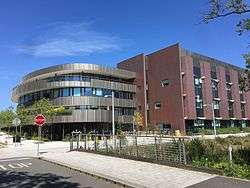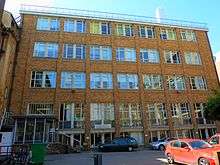Department of Chemical Engineering and Biotechnology, University of Cambridge
 | |
| Established | 1945 |
|---|---|
| Affiliation | University of Cambridge |
| Head of Department | Professor John Dennis |
Academic staff | 29 |
| Undergraduates | 200 |
| Postgraduates | 170 |
| Location |
Cambridge, United Kingdom 52°12′33″N 0°05′09″E / 52.209208°N 0.085819°ECoordinates: 52°12′33″N 0°05′09″E / 52.209208°N 0.085819°E |
| Website |
www |
The Department of Chemical Engineering and Biotechnology (CEB) is one of the Departments at the University of Cambridge.
The department trains undergraduate students and conducts original research at the interfaces between engineering, chemistry, biology and physics. It conducts research in collaboration with industrial partners. Its research programmes encompass sustainable reaction engineering, chemical product and process design, healthcare, measurement, and materials science. It conducts biotechnology research with chemical engineering at the science-engineering interface.
History

In 1945, the University received an endowment from Shell for a chemical engineering department and chair. The first Shell Professor was T.R.C. Fox, appointed in 1946. The undergraduate Tripos course began in 1948. Professor P. V. Danckwerts was head of department from 1959 to 1975 and then Professor J F Davidson became Shell Professor and Head of department in 1975. He held the post until 1993 when he retired.
in 2008, the Department of Chemical Engineering merged with the Institute of Biotechnology to become the Department of Chemical Engineering and Biotechnology.[1]
Until 2017, the department's main centre of activity was the Shell building on Pembroke Street on the New Museums Site, to the south of Cambridge city centre. In 2017, the department moved over to a new building on Philippa Fawcett Drive on the West Cambridge site.
The building was officially opened by the Chancellor of the University, Lord Sainsbury of Turville, on 24 April 2018.[2]
Degrees offered
- PhDs in Chemical Engineering and Biotechnology. Well qualified candidates may apply to do a three year research degree in subjects from Adsorption to Zeolites. The research groups are listed below. Some studentships are fully funded and these are advertised on https://www.ceb.cam.ac.uk/phd
- M.Phil. by research. This is a one year research course and many students who complete this MPhil then go on to study for a PhD.
- M.Phil. in Advanced Chemical Engineering. This is a one year course that combines research and teaching and equips candidates for careers in industry, government and academia.
- Master of Bioscience Enterprise. A biotechnology and business degree course that takes place from October to June.
- M.Phil. in Biotechnology. This is a brand new course, starting in October 2018. It is an 11-month full-time programme, combining taught and research components. https://www.ceb.cam.ac.uk/biotech
- BA/MEng.
Scholarships
To find out if you are eligible for a scholarship at the University of Cambridge, use the scholarship search tool: https://www.cambridgetrust.org/scholarships/
Research groups
Research in the department is conducted by a number of research groups:
- Acoustic Wave Physics Dr Adrian Stevenson
- Adsorption & Advanced Materials group Dr David Fairen-Jimenez
- Bioelectronic Systems Technology Dr Róisín M. Owens
- BioNano Engineering Group Dr Ljiljana Fruk
- BioScience Engineering group Prof Nigel Slater
- Cambridge Analytical Biotechnology group Prof Lisa Hall
- Cambridge Centre for Neuropsychiatric Research Prof Sabine Bahn
- Catalysis group Prof Lynn Gladden
- Colloidal Dispersions group Prof Alex Routh
- Combustion group Prof John Dennis
- Computational Modelling group Prof Markus Kraft
- Electrochemical and Micro Engineering group Dr Adrian Fisher
- Fluids and Environment group Prof Silvana Cardoso
- Laser Analytics group Prof Clemens Kaminski
- Magnetic Resonance group Prof Lynn Gladden
- Molecular Engineering Group Prof Jacqui Cole
- Molecular Microbiology Dr Graham Christie
- Molecular Neuroscience Group Dr Gabriele Kaminski Schierle
- Paste, Particle and Polymer Processing group Prof Ian Wilson, Dr Bart Hallmark, Dr Sarah Rough
- Process Integration Group Dr Laura Torrente
- Process Systems Engineering group Dr Vassilios Vassiliadis
- Quantitative Imaging Dr Eric Rees
- Statistical Physics Group Dr Alessio Zaccone
- Structured Materials group Prof Geoff Moggridge
- Sustainable Reaction Engineering group Prof Alexei Lapkin
- Terahertz Applications group Prof Axel Zeitler
References
- ↑ "We've merged! — Department of Chemical Engineering and Biotechnology". www.ceb.cam.ac.uk. Retrieved 2018-05-21.
- ↑ "Official opening — Department of Chemical Engineering and Biotechnology". University of Cambridge. 11 May 2018. Retrieved 18 May 2018.